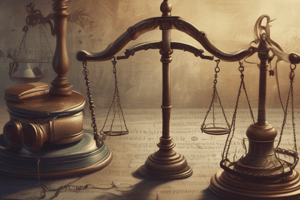Podcast
Questions and Answers
What is the primary focus of the field of analysis in this lecture?
What is the primary focus of the field of analysis in this lecture?
- Social justice and economic wealth distribution
- Philosophy of justice and morality
- Human rights and democracy
- Criminal law and crime prevention (correct)
What is the primary distinction between traditional responses to wrongdoing and restorative justice?
What is the primary distinction between traditional responses to wrongdoing and restorative justice?
- Use of violence versus use of forgiveness
- Focus on retribution versus focus on restitution
- Use of punishment versus rehabilitation
- Reliance on coercion versus reliance on consent and participation (correct)
What is the primary goal of the development of judicial proceedings in the history of justice systems?
What is the primary goal of the development of judicial proceedings in the history of justice systems?
- To punish wrongdoers more severely
- To provide a fair and impartial trial
- To take revenge on behalf of the victims
- To transfer the reaction to wrongdoing from private hands to public authorities (correct)
What is the characteristic of restorative justice that is related to democracy and freedom?
What is the characteristic of restorative justice that is related to democracy and freedom?
What is the primary difference between traditional reactions to wrongdoing and more challenging ways of responding to injustices?
What is the primary difference between traditional reactions to wrongdoing and more challenging ways of responding to injustices?
What is the primary goal of retribution in response to wrongdoing, according to retributive justice theory?
What is the primary goal of retribution in response to wrongdoing, according to retributive justice theory?
What is the key principle that distinguishes retribution from retaliation law?
What is the key principle that distinguishes retribution from retaliation law?
Why is retribution considered problematic?
Why is retribution considered problematic?
What is the significance of the Hammurabi law in the context of retribution?
What is the significance of the Hammurabi law in the context of retribution?
What is the relation between retribution and the concept of justice?
What is the relation between retribution and the concept of justice?
Flashcards are hidden until you start studying
Study Notes
Justice and Criminal Law
- Justice is used to respond to wrongdoing, not to address social justice or inequalities.
- The focus of the analysis is on criminal law and crime prevention.
Historical Reactions to Wrongdoing
- Humanity has historically reacted to wrongdoing through:
- Violence
- Self-made justice through arbitrary actions
- Vengeance
- Separation and segregation of wrongdoers
- Punishment often accompanied by violence, segregation, and retaliation
- More challenging ways to respond to injustices and wrongdoing have also been used:
- Negotiated agreements
- Rehabilitation or corrections
- Reparations and forgiveness
The Birth of Justice Systems
- Justice systems emerged to avoid arbitrary and personal reactions based on self-made justice or law.
- The birth of courts and tribunals aimed to put reactions to wrongdoing in the hands of public authorities, not private individuals.
- The goal was to prevent violent and retaliatory reactions from victims.
Theories of Punishment
- There are two main theories of punishment:
- Retribution
- Prevention
- Retribution is the most ancient and dominant model of justice, where the response to evil is evil in return.
- Retribution aims to make the offender suffer in return, with punishment as the primary goal.
- The problem with retribution is that it can be hugely problematic and is often used in conjunction with violence.
Restorative Justice
- Restorative justice modifies the classification of punishment theories and introduces a new taxonomy.
- Restorative justice focuses on democracy, freedom, fundamental liberties, and people's empowerment.
- It uses consent and participation, rather than force and coercion.
Studying That Suits You
Use AI to generate personalized quizzes and flashcards to suit your learning preferences.




